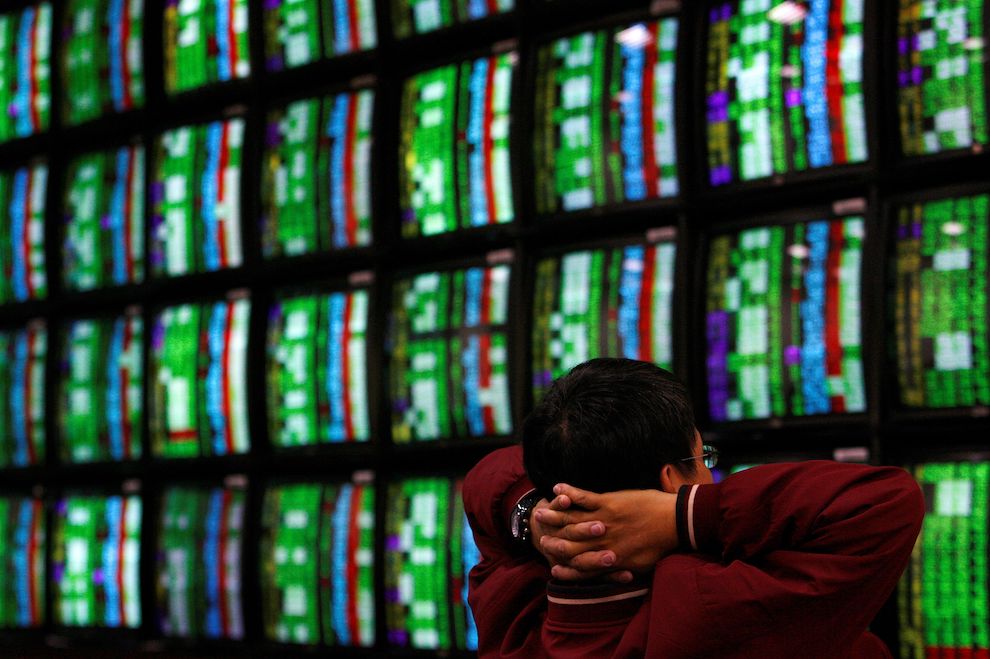Asian stock markets had a lacklustre start to trading on Monday with stocks on mainland China seeing their biggest one-day fall in seven weeks, while Hong Kong, Tokyo and Sydney also declined.
The main concern in China is that surging Covid cases will disrupt the normal business operations in major cities. The rally seen in Chinese markets over recent weeks has been overtaken by far more wary trading.
Chinese authorities announced further Covid deaths on Monday, after the slow re-opening of the world’s second-largest economy following nearly three years of aggressive lockdowns.
Health officials elsewhere remain worried that a rapid change in China’s Covid rules could result in a wave of infections and a surge in deaths, given its poor record on vaccinations. But there is widespread scepticism about both the official death toll and Covid data now that mass testing has been dropped.
Beijing has flagged a number of measures aimed at kickstarting growth next year, including support for the beleaguered property sector.
But there was also a warning on Saturday by Wu Zunyou, chief epidemiologist at the Chinese Centre for Disease Control and Prevention, that the country could face three waves of Covid infections over coming months – speculation that may undermine government plans to bolster the economy in the short-term.
Analysts at Jeffries have suggested that over 40% of citizens in Beijing may currently have Covid and that other major centres could also see peak infection rates in the near-future.
To date, signs of upheaval have been limited largely to events in the capital, with Japanese chipmaker Renesas forced to close its factory in the Chinese capital amid a jump in infectious among its employees.
Trading floors in Beijing and to a lesser degree Shanghai also suffered impacts from the absence of employees for health reasons.
The CSI 300 Index, of the top 300 stocks traded in Shanghai and Shenzhen, fell by 1.5% – its largest drop since October 28 – as healthcare and telecom stocks dropped.
The Shanghai Composite Index had a poor day, sliding 1.92%, while the Hang Seng Index in Hong Kong enjoyed an early rise before falling 0.5%.
But China’s edge towards reopening has helped oil prices firm, which edged up modestly in overnight trading, supported as well by reports that the US government is looking to begin replenishing the Strategic Petroleum Reserve with a fixed price purchase of 3 million barrels.
ALSO SEE:
Covid Pushes China Business Confidence to Lowest in a Decade
In Japan, the Nikkei fell 1.05% to a six-week low, while the yen rose 0.5% to 135.9 per US dollar. MSCI’s broadest index of Asia-Pacific shares outside Japan fell 0.15%.
Japan will consider revising a 2% inflation target agreed between the government and central bank next year, sources said, a move that may heighten the chance of a tweak to the BOJ’s ultra-loose monetary policy.
“Where there’s smoke, eventually there is fire,” National Australia Bank strategist Rodrigo Catril said in Sydney.
“This sort of news we’re getting plays to this view that the government will open the door for the BOJ to have a more flexible approach,” he said, “and that some of this uber-undervaluation of the yen can be reversed.”
The yen has been the worst-performing G10 currency this year, with a 15% loss against the dollar, driven mainly by the gap between rising US rates and anchored Japanese rates.
Five-year Japanese government bond yields hit a nearly eight-year high.
The three main indexes on Wall Street ended sharply lower on Friday after the Federal Reserve warned that it would continue tightening monetary policy into 2023.
That was followed by similar warnings from the European Central Bank and Bank of England, while data suggested economies were feeling the pinch, dealing a blow to sentiment heading into the Christmas break.
The sell-off in New York fed through to most of Asia. The Kospi in Seoul slipped by 0.4% to 2,350.27 and Sydney’s S&P-ASX 200 was 0.2% down at 7,137.00.
Singapore rose, but Manila, Jakarta and most other Southeast Asian markets dropped. In India, the Nifty 50 defied the regional slump by rising 0.83%.
Dollar Index Slips
The US dollar index – which tracks the greenback against a basket of six major currencies – fell 0.4% on Monday to 104.410, reversing some of its gains from the previous week after the US Fed and European Central Bank hiked rates.
A rebound in risk sentiment across markets pushed European stocks higher after a bruising selloff last week, while currencies including the euro and sterling retraced some of their losses from the previous two sessions.
The euro gained 0.4% to $1.06260, while sterling strengthened 0.7% to $1.22195. However, both remained lower than their levels before last week’s central bank moves.
“Markets are trying to find their feet a bit,” said Kenneth Broux, currency strategist at Societe Generale. “I wouldn’t hang my hat on the price action this morning.”
Hopes for improvements in demand lifted oil prices on Monday, with Brent crude futures up 0.4% at $79.36 a barrel, but it has barely gained for the year.
Gold inched 0.3% higher steady at $1,769 an ounce. Bitcoin remained trading below $17,000.
- Jim Pollard with Reuters
ALSO SEE:
More Than a Million People Could Die of Covid in China: Analysts
Companies in China Scrambling to Keep Open as Covid Spreads
Plunging Trade Risks China’s Status as the ‘World’s Factory’
























